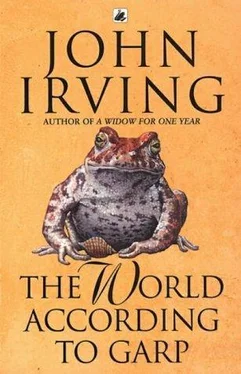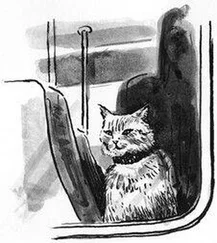Garp stood still while Dickie examined him.
“You were a friend of Kenny Truckenmiller's?” Garp asked.
“Yup,” Dickie said. “I was his only friend. I introduced him to Harriet,” Dickie said. Garp nodded. Dickie eyed the new hairdo.
“It's tragic,” Garp said; he meant everything that had happened.
“It ain't bad,” Dickie said; he meant Garp's hair.
“Jenny Fields was my mother,” Garp said, because he wanted someone to know, and he felt certain he was taking no emotional advantage of Dickie.
“You didn't tell her that, did you?” Dickie said, pointing toward the house, and Harriet, with his long ax.
“No, no,” Garp said.
“That's good,” Dickie said. “She don't want to hear nothin'like that.”
“I didn't think so,” Garp said, and Dickie nodded approvingly.
“Your sister is a very nice woman,” Garp added.
“She is , she is,” Dickie said, nodding fiercely.
“Well, so long,” Garp said. But Dickie touched him lightly with the handle of the ax.
“I was one of them who shot him,” Dickie said. “You know that?”
“You shot Kenny?” Garp said.
“I was one of them who did,” Dickie said. “Kenny was crazy. Somebody had to shoot him.”
“I'm very sorry,” Garp said. Dickie shrugged.
“I liked the guy,” Dickie said. “But he got crazy at Harriet, and he got crazy at your mother. He wouldn't ever have got well, you know,” Dickie said. “He just got sick about women. He got sick for good. You could tell he wasn't ever going to get over it.”
“A terrible thing,” said Garp.
“So long,” Dickie said; he turned back to his woodpile. Garp turned toward his car, across the frozen turds that dotted the yard. “Your hair looks good!” Dickie called to him. The remark seemed sincere. Dickie was splitting logs again when Garp waved to him from the driver's seat of his car. In the window of NANETTE'S BEAUTY SALON Harriet Truckenmiller waved to Garp: it was not a wave meant to encourage him, or anything, he was quite sure. He drove back through the village of North Mountain—he drank a cup of coffee in the one diner, he got gas at the one gas station. Everyone looked at his pretty hair. In every mirror, Garp looked at his pretty hair! Then he drove home, arriving in time for the celebration: Ellen's first publication.
If it made him as uneasy as the news had made Helen, he did not admit it. He sat through the lobster, the scallops, and the champagne, waiting for Helen or Duncan to comment on his hair. It was only when he was doing the dishes that Ellen James handed him a soggy note.
You had your hair done?
He nodded, irritably.
“I don't like it,” Helen told him, in bed.
“I think it's terrific,” Garp said.
“It's not like you,” Helen said; she was doing her best to muss it up. “It looks like the hair on a corpse,” she said in the darkness.
“A corpse!” Garp said. “Jesus.”
“A body prepared by an undertaker,” said Helen, almost frantically running her hands through his hair. “Every little hair in place,” she said. “It's too perfect. You don't look alive!” she said. Then she cried and cried and Garp held her and whispered to her—trying to find out what the matter was.
Garp did not share her sense of the Under Toad—not this time—and he talked and talked to her, and made love to her. Finally, she fell asleep.
The essay by Ellen James, “Why I'm Not an Ellen Jamesian,” appeared to engender no immediate fuss. It takes a while for most Letters to the Editor to be printed.
There were the expectable personal letters to Ellen James: condolences from idiots, propositions from sick men—the ugly, antifeminist tyrants and baiters of women who, as Garp had warned Ellen, would see themselves as being on her side.
“People will always make sides,” Garp said, “—of everything.”
There was not a written word from a single Ellen Jamesian.
Garp's first Steering wrestling team produced an 8-2 season as it approached its final dual meet with its arch rival, the bad boys from Bath. Of course, the team's strength rested on some very well coached wrestlers whom Ernie Holm had brought along for the last two or three years, but Garp had kept everyone sharp. He was trying to estimate the wins and losses, weight class by weight class, in the upcoming match with Bath—sitting at the kitchen table in the vast house now in memory of Steering's first family—when Ellen James burst upon him, in tears, with the new issue of the magazine that had published her a month ago.
Garp felt he should have warned Ellen about magazines, too. They had, of course, published a long, epistolary essay written by a score of Ellen Jamesians, in response to Ellen's bold announcement that she felt used by them and she disliked them. It was just the kind of controversy magazines love. Ellen felt especially betrayed by the magazine's editor, who had obviously revealed to the Jamesians that Ellen James now lived with the notorious T. S. Garp.
Thus the Ellen Jamesians had that to get their teeth into: Ellen James, poor child, had been brainwashed into her antifeminist stance by the male villain, Garp. The betrayer of his mother! The smirking capitalizer on women's-movement politics! In the various letters, Garp's relationship with Ellen James was referred to as “seductive,” “slimy,” and “underhanded.”
I'm sorry!
Ellen wrote.
“It's okay, it's okay. Nothing's your fault,” Garp assured her.
I'm not an antifeminist!
“Of course you're not,” Garp told her.
They make everything so black and white.
“Of course they do,” said Garp.
That's why I hate them. They force you to be like them—or else you're their enemy.
“Yes, yes,” Garp said.
I wish I could talk.
And then she dissolved, crying on Garp's shoulder, her wordless, angry blubber rousing Helen from the far-off reading room of the great house, driving Duncan from the darkroom, and waking baby Jenny from her nap.
So, foolishly, Garp decided to take them on, these grown-up crazies, these devout fanatics who—even when their chosen symbol rejected them—insisted they knew more about Ellen James than Ellen James knew about herself.
“Ellen James is not a symbol,” Garp wrote. “She is a rape victim who was raped and dismembered before she was old enough to make up her own mind about sex and men.” Thus he began; he went on and on. And, of course, they published it—liking any fuel to any fire. It was also the first published piece of anything by T. S. Garp since the famous novel, The World According to Bensenhaver .
Actually, it was the second. In a little magazine, shortly after Jenny's death, Garp published his first and only poem. It was a strange poem; it was about condoms.
Garp felt his life was marred by condoms—man's device to spare himself and others the consequences of his lust. Our lifetime, Garp felt, was stalked by condoms—condoms in the parking lots in the early mornings, condoms discovered by children in the playing sand of the beaches, condoms used for messages (one to his mother, on the door knob of their tiny wing apartment in the infirmary annex). Condoms unflushed down the dormitory toilets of the Steering School. Condoms lying slick and cocky in public urinals. Once a condom delivered with the Sunday paper. Once a condom in the mailbox at the end of the driveway. And once a condom on the stick-shift shaft of the old Volvo; someone had used the car overnight, but not for driving.
Condoms found Garp the way ants found sugar. He traveled miles, he changed continents, and there—in the bidet of the otherwise spotless but unfamiliar hotel room...there—in the back seat of the taxi, like the removed eye of a large fish ...there—eyeing him, from the bottom of his shoe, where he picked it up, somewhere. From everywhere condoms came to him and vilely surprised him.
Читать дальше












